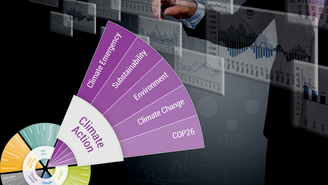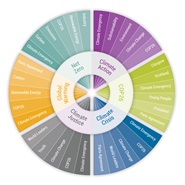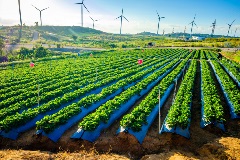The Sustainability Conundrum of Living Income in Agriculture
Living Income is a crucial consideration among leading companies across some sectors and their supplier companies throughout the agricultural and food supply chain. Companies that manage ESG risk in their supply chains, making targeted investments to improve their resilience, are better positioned to build investor confidence.
EU Taxonomy in Limbo - Reporting Alignment of Article 8 and 9 Funds in 2022
For observers of the EU’s Sustainable Finance Strategy, 2022 kicked off with a crack and a bang as the European Commission went ahead with plans to include natural gas and nuclear-related activities as potentially sustainable under their ‘Green Taxonomy’. However, in midst of this furor, seemingly less attention has been paid to other components of the regulation that have quietly taken effect from the 1st of January 2022, presenting their own set of challenges.
What Happens When Companies are Receptive to Investor Feedback on ESG?
When companies are receptive to investor feedback, there are clear real-world impacts and positive changes. Such engagement outcomes vary and are directly tied to the company and its company-specific exposure to material ESG issues.
For Investors with Ambitions to Lead on Climate Action Post COP26
In the weeks following COP26, investors in the UK and worldwide face a myriad of upcoming climate-related regulations heading towards the implementation phase. In addition, major global coalitions such as the Glasgow Financial Alliance for Net Zero have sprung up to attempt to accelerate decarbonization via targeted investment.
A Closer Look at Product Governance ESG Risk Management
In 68% of our engagements, product governance is a significant material ESG issue, but it is our experience that most companies underestimate the materiality of this risk to investors. For some industries, product governance represents on average more than 20% of ESG risk exposure, as identified within our ESG Risk Rating framework.
COP 26: A Spotlight on Emerging Climate Action Themes for Investors
Reactions to the COP26 Conference and the resulting Glasgow Climate Pact have predictably run the gamut from claims of greenwashing to the celebration of progress in the fight against climate change. Ultimately, any judgement on COP26 may be premature, as the success of the conference will best be measured in time by the extent to which commitments made are put into motion. While we wait to see the concrete actions that materialize, the past two weeks have underscored the importance of several themes that will garner increasing attention and should be considered by sustainable investors.
The Impact and Cost of Air Pollution: U.S. Petroleum Refineries
Investors can examine to what extent petroleum refiners manage their Non-GHG Air Emissions and assess the quality of a company's programs to reduce air pollutants. For instance, examining all the petroleum refiners assessed by Sustainalytics, we observe that only 3% have a strong program to manage non-greenhouse gas emissions.
Recent market trends put engagement and voting front and centre for responsible investors
From a market perspective, engagement and voting on governance issues have been used as levers for influence for a long time. On the other hand, environmental and social issues were historically addressed from a values-based perspective or primarily for fact-finding purposes. Today, many responsible investors leverage corporate dialogue as a tool to influence and drive meaningful change and impact
North American Material Risk Engagement Trends: ESG Reporting Frameworks, Emission Reduction Targets and Beyond
There are many factors that rating agencies consider within its overall assessment. For example, ESG rating companies tend to look for at least three years of ESG metrics to determine company trends and long-term ESG targets, goals, and strategies to manage and reduce ESG risks at least five years ahead. Read on to learn about how Sustainalytics' Material Risk Engagement program promotes and protects long-term value by engaging with high-risk companies on financially-material ESG issues. (A North American Snapshot)
ESG Risks of Aging Pipelines for U.S. Energy Infrastructure Investors
Pipelines play a critical role in the U.S energy infrastructure transporting natural gas, crude oil, natural gas liquids, petroleum, and petrochemical products. While these pipelines play a vital role in supporting the U.S economy, investors are increasingly scrutinizing pipeline operators' long-term economic profitability and sustainability practices. A closer look into the status of pipelines reveals a particular issue that investors need to consider.
Delays, Questions and Confusion: Updates on the EU’s Sustainable Finance Disclosure Regulation
In this blog, we look at the delay of the level 2 regulation, some aspects of the Q&A, and the ongoing confusion and divergence around SFDR. We pay special attention to the potential impact of the Principle Adverse Impact indicators, an element of SFDR.
EU Taxonomy Developments and the EU’s Renewed Sustainable Finance Strategy
On July 6th, the European Commission published its Strategy for Financing the Transition to a Sustainable Economy, the successor of the EU’s Sustainable Finance Action Plan, which launched in 2018. The strategy focuses on transforming the financial system and financing transition plans, building on the 2018 Action Plan, which centered on developing the EU Taxonomy, putting in place disclosure regimes, and developing tools for the market to develop sustainable investment solutions and prevent greenwashing.
Using Systems Thinking to Avoid ESG Investing Blind Spots
For investors looking to enhance ESG risk management and the long-term impact of sustainability efforts, a systemic approach can help identify interventions that will most effectively mitigate the risk of negative outcomes or divert the chain of events towards a more sustainable trajectory. Typically, this involves moving from single-issue or company-specific tactics to progressively integrate system-level considerations in ESG strategies. Targeting systemic change through active ownership is one way to acknowledge and start unravelling the dynamic web of global challenges.
Royal Dutch Shell Court Order Shifts Paradigm for Corporate ESG Accountability
On 26 May 2021, the Court of The Hague orders Royal Dutch Shell (RDS) to reduce CO2 emissions to a net 45% by the end of 2030 compared to 2019 through the Group Policy of the Shell Group. The order of a national (Dutch) court demands that a global company (RDS) fulfills its obligations under the Paris Climate Agreement, although RDS was not a party in that agreement, and there is no legal equivalent in The Netherlands. What are the broader consequences of this order, also globally and for other companies and potentially also other jurisdictions?
New Draft Disclosure Rules Change Timelines and Scope of EU Taxonomy
In recent months, a lot has been said and written about the EU Taxonomy, the green classification system of economic activities that aims to drive capital flows to sustainable investments supporting the EU’s policy goals on climate and the environment. Political, corporate, and civil society lobbying reached its peak when the EU published draft rules last December, which deviated substantially from expert recommendations. However, the latest draft delegated act with rules on Taxonomy reporting published by the European Commission on May 7th has received far less attention even though some of the proposed changes affect the practical implementation timelines as well as the scope and ambition of the regulation.
Bringing Investors and Companies Together to Address the Climate Change Crisis
As Earth Day is around the corner on the 22nd of April, the Biden Administration is to convene a global climate summit. Following a historical precedent for several such events, since its inception in 1970, including signing the landmark Paris Agreement . We have seen positive developments since the Paris Agreement; societal actions to address some of the root causes of climate change have yet to suppress the negative trends . Historically, active ownership on climate change has focused on direct emissions from highly exposed sectors, such as fossil fuel and utility companies. However, the more complicated, less direct aspects of climate change have seen limited progress. Tackling such issues will see a strong need for collaboration from both countries and other key sectors, in particular, banking and finance. Banks are key to support this transformation; facilitating economic activity for positive change throughout the entire value chain is key.
A Reflection of Water Reporting Around the World
On World Water Day, we reflect on global companies’ dedicated attention to this most vital resource. Water risks are related to nine of the top ten worst global risks in the Global Risk Report published by the World Economic Forum, with risks likely to increase due to climate change. As global water resources contend with increased stress, companies are expected to face growing scrutiny of their water use due to the significant impacts that it can have on resource security and the health of ecosystems. This scrutiny may manifest in business risk, including limits placed on water withdrawal, increasing costs and heightened regulations.
10 for 2021: Investing in the Circular Economy
This report aims to support investors interested in gauging environmental, social and governance (ESG) risks and opportunities in the global food value chain. We survey key subindustries – from agrochemicals, agriculture and aquaculture to packaged food, food retail and restaurants – in search of solutions that may support the principles of the circular economy (CE). These principles include minimizing waste and pollution, extending the use-phase of products and ecosystem regeneration. Some of the key insights found in the report are:
Is Natural Gas a Cleaner Energy Solution?
While Oil and Gas (O&G) operations are responsible for roughly 15 percent of global energy-related GHG emissions, some energy companies have pledged the role of natural gas (NG) as a transitional fuel. At the same time, NG energy use is increasing globally, and shale-gas extraction is booming at an unprecedented rate. One factor that is often overlooked is the methane emissions across the NG value chain.











.tmb-thumbnl_rc.jpg?Culture=en&sfvrsn=f9fcdf85_1)





.tmb-thumbnl_rc.jpg?Culture=en&sfvrsn=d0660f9e_1)

